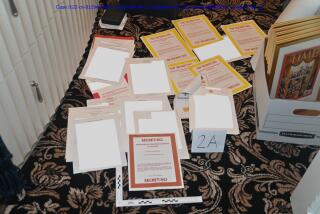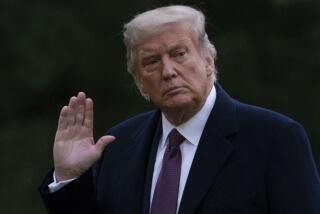U.S. Officials Weighing Indictment of Marcos : Inquiry in Final Stages; July 18 Deadline Looms for Any Charges in Politically Sensitive Case
- Share via
NEW YORK — Federal prosecutors have reached the final stages of an investigation into fraud and conspiracy allegations against Ferdinand and Imelda Marcos and are racing a July 18 deadline to indict the deposed Philippine president and his wife before the statute of limitations expires on suspected criminal violations, The Times has learned.
The case, which could also face political obstacles in Washington, stems at least in part from assertions that the Marcoses used millions of dollars in Philippine government funds to purchase art and American real estate and then engaged in elaborate schemes to conceal their ownership, to convert the assets to cash for their own use and to evade taxes.
Also under investigation in connection with those allegations is Saudi Arabian financier Adnan Khashoggi, who posed as the owner of valuable paintings and New York property secretly held by Marcos, according to claims in separate civil court documents here.
New York investigators were in Washington early this week for meetings with top-level Justice Department officials who must approve any legal actions against Marcos. The case, which bristles with domestic and international political implications, also will be weighed by the White House and State Department for its foreign policy ramifications before any indictment is sought, an Administration source said.
Lesson of Noriega Case
“We don’t want another sloppy Noriega case,” one source said, referring to the political and diplomatic embarrassments that followed the indictment of Panamanian strongman Manuel A. Noriega on drug charges earlier this year. That case--an unprecedented criminal action against a foreign leader--was badly handled, many in the Administration believe.
Further, the Marcos case poses an unusual dilemma for the White House: If the former Philippine leader is indicted, President Reagan could be accused of breaking his promise of providing a safe haven to his one-time good friend. If he is not charged, however, the Administration would offend the current Philippine government, which has been cooperating in the investigation and has an important strategic relationship with the United States.
It was Reagan who, at the height of the Philippine revolution in February, 1986, persuaded Marcos to leave the Philippines voluntarily with the safe-haven guarantee, which eventually brought him to exile in Hawaii.
“There’s no question,” said an associate of Marcos, “that Marcos is going to see this indictment as a personal betrayal” by Reagan.
However, one Administration official who spoke on condition of anonymity said that Marcos “was promised safe haven, but he wasn’t promised he would never be indicted.”
The Marcoses have looked to the White House for protection from other legal attacks since their arrival in Hawaii.
For example, in a two-page letter to Nancy Reagan dated Sept. 11, 1986, Imelda Marcos appealed for White House help to prevent lawyers for the Philippine government from taking their sworn depositions in connection with a civil racketeering lawsuit pending in California.
The handwritten letter, a copy of which was obtained by The Times, called the depositions humiliating and painful. It was addressed to “Dearest Nancy” and signed “Much, much love, Imelda.”
“I understand that a ‘suggestion’ from the ‘White House’ or the ‘State Dept.’ could prevent these indignities to an ally and friend,” Imelda Marcos wrote. She asked for Mrs. Reagan’s “invaluable help to prevent” the depositions.
The letter was delivered to Nancy Reagan through a National Security Council aide who refused to comment. It could not be determined whether the First Lady responded to Imelda Marcos, but the depositions took place as scheduled in Hawaii two weeks later.
Many civil proceedings have been launched against the Marcoses and some of their closest associates in U.S. and foreign courts, most of them filed by representatives of the Philippine government of Corazon Aquino. An exasperated Marcos once told a visitor that he was “spending a million dollars a month on lawyers.”
Charges of Hidden Wealth
The Philippine government accuses Marcos of hiding more than $2 billion in cash and assets belonging to that country, and it has succeeded in freezing much of Marcos’ assets in the United States and Switzerland until the litigation has been completed.
A federal grand jury in New York, one of three U.S. panels looking into separate allegations of possible criminal conduct by Marcos, is examining allegations of illegal transactions, principally involving art and real estate.
It was one of those questionable property transactions in July, 1983--a deal involving the transfer of documents and funds related to an office building at 200 Madison Ave. here--that has made the five-year statute of limitations a deadline factor in forcing an immediate decision on the Marcos indictment.
Within the Justice Department, however, there is some dispute over whether prosecutors should meet the July 18 deadline or spend more time honing their case. In addition, other potentially serious allegations in the case would not be affected by any immediate statute of limitations problems.
Documents Allegedly Backdated
Investigators have looked into other real estate transactions, for example, in which documents allegedly were backdated in 1986 to make it appear that Khashoggi had bought various New York office buildings in 1985, before a court-ordered freeze on all Marcos holdings.
Also, at least $25 million in cash held by one Liechtenstein shell company claiming an interest in some of the New York real estate was transferred in 1986 from a frozen Swiss bank account after Khashoggi and Marcos’ Geneva banker told Swiss authorities that Khashoggi, not Marcos, owned the firm, according to court documents and sources familiar with the transactions.
Khashoggi then delivered the $25 million to Gliceria Tantoco, a confidante of Imelda Marcos, in West Germany, sources say. Swiss authorities are conducting their own criminal investigation of these transactions, The Times has confirmed.
Tantoco, the wife of a former Marcos ambassador to the Vatican, already has been indicted in New York on separate fraud and tax evasion charges stemming from large art purchases allegedly made on behalf of the Marcoses. Tantoco is a fugitive, however, since jumping bail in Italy while awaiting extradition to the United States earlier this year. Her flight stymied apparent plans to pressure her into cooperation with federal investigators on the Marcos case.
Khashoggi Cooperation
Sources said that federal efforts also have been directed toward getting cooperation from Khashoggi. Recently, those efforts apparently centered on negotiations to have Khashoggi return millions of dollars in art that the Philippine government contends was stolen by Marcos and given to Khashoggi to sell in exchange for a commission. At one point, Khashoggi attempted to sell some of the art during a visit to Greece on his yacht, sources said.
As recently as last February, Khashoggi reportedly had agreed to return the art but later changed his mind. Last month, however, a French court ordered the art seized and returned to the United States as evidence in the New York criminal investigation.
Marcos and various associates also are under criminal investigation by federal grand juries in Hawaii and Virginia.
The panel in Honolulu is looking into possible violations of federal neutrality laws stemming from allegations that Marcos is leading efforts to destabilize the Aquino government in preparation for his return to power. In Alexandria, Va., investigators have been probing reports that Marcos may have converted U.S. military assistance funds to his personal use while still president of the Philippines.
However, neither case is as close to an indictment decision as the New York case, sources said.
Manila Aides Concerned
Philippine officials who are closely monitoring and assisting in the U.S. investigations have expressed private concern that recent resignations of top-level Justice Department officials might delay or even threaten the Marcos indictment. Some of those officials, who quit to distance themselves from the legal problems of Atty. Gen. Edwin Meese III, authorized the New York investigation and supervised its development.
Subsequently, doubts have been raised inside the Justice Department over the extent of foreign evidence and witnesses required to prosecute the case.
But this week President Aquino relayed renewed assurances to Washington that her government would give full assistance to U.S. prosecutors, sources said.
“We’re interested in assisting whatever forum will help get the truth out,” said a Philippine official who called Marcos “a thieving dictator.”
Marcos also is a target of criminal investigations in Manila over possible violations of Philippine law.
Times staff writers Ronald J. Ostrow, Jack Nelson, Jim Mann and James Gerstenzang in Washington contributed to this story.
More to Read
Sign up for Essential California
The most important California stories and recommendations in your inbox every morning.
You may occasionally receive promotional content from the Los Angeles Times.












